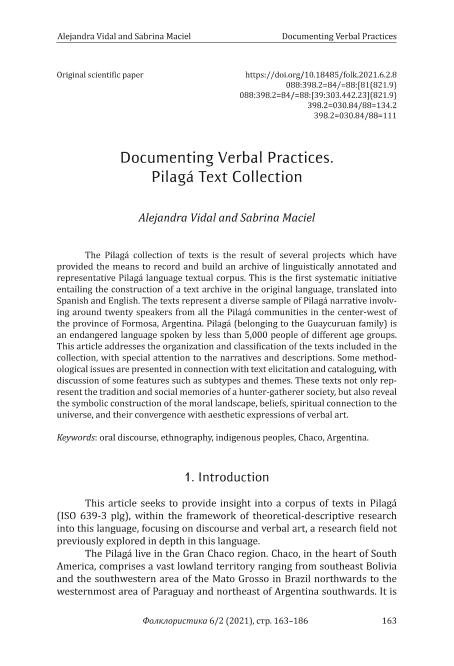Mostrar el registro sencillo del ítem
dc.contributor.author
Vidal, Alejandra Silvia

dc.contributor.author
Maciel, Aída Sabrina

dc.date.available
2022-09-06T11:45:52Z
dc.date.issued
2021-12
dc.identifier.citation
Vidal, Alejandra Silvia; Maciel, Aída Sabrina; Documenting verbal practices: Pilagá text collection; Serbian Folklore Association; Folkloristica; 6; 2; 12-2021; 163-186
dc.identifier.issn
2560-4414
dc.identifier.uri
http://hdl.handle.net/11336/167490
dc.description.abstract
The Pilagá collection of texts is the result of several projects which have provided the means to record and build an archive of linguistically annotated and representative Pilagá language textual corpus. This is the first systematic initiative entailing the construction of a text archive in the original language, translated into Spanish and English. The texts represent a diverse sample of Pilagá narrative involving around twenty speakers from all the Pilagá communities in the center-west of the province of Formosa, Argentina. Pilagá (belonging to the Guaycuruan family) is an endangered language spoken by less than 5,000 people of different age groups. This article addresses the organization and classification of the texts included in the collection, with special attention to the narratives and descriptions. Some methodological issues are presented in connection with text elicitation and cataloguing, with discussion of some features such as subtypes and themes. These texts not only represent the tradition and social memories of a hunter-gatherer society, but also reveal the symbolic construction of the moral landscape, beliefs, spiritual connection to the universe, and their convergence with aesthetic expressions of verbal art.
dc.description.abstract
La colección de textos pilagá es el resultado de varios proyectos que han proporcionado los medios para registrar y construir un archivo lingüísticamente anotado y representativo del arte verbal de esa comunidad de hablantes. Esta es la primera iniciativa sistemática para construir un archivo textual en lengua original, traducido al español y al inglés. Los textos representan una muestra de la diversidad de la narrativa Pilagá, de aproximadamente veinte hablantes de todas las comunidades Pilagá del centro-oeste de la provincia de Formosa, Argentina. El Pilagá (perteneciente a la familia Guaycurú) es una lengua en peligro de extinción, hablada por menos de 5000 personas de diferentes grupos etarios. Este artículo trata acerca de la organización y clasificación de dichos textos; particularmente, los del género narrativo. Los textos narrativos del corpus oral han sido agrupados, en primer lugar, según su estructura y estilo y, luego, por subgrupos temáticos, sin perder de vista lo anterior. Este trabajo proporciona un curso de entrada a las discusiones en torno a la clasificación de textos de un corpus diverso, en el contexto de la documentación de una lengua en peligro, y expone además la metodología adoptada y los criterios de organización de los registros.
dc.description.abstract
Збирка текстова на пилага језику је резултат неколико пројеката који су омогућили да се сними и изгради архив којег чини лингвистички анотиран и репрезентативан корпус текстова на језику пилага. Ово је прва систематска иницијатива која је омогућила успостављање архива текстова на оригиналном језику, као и у преводу на шпански и енглески. Текстови представљају разноврстан узорак прича на пилаги и укључују око двадесет говорника из свих заједница које говоре пилагу, у централно-западној покрајини Формоса у Аргентини. Језик пилага припада породици гвајакурских језика и припада угроженим језицима – њиме говори мање од 5000 људи различите старосне доби. Рад је усмерен на организацију и класификацију текстова који су укључени у збирку, а посебна пажња посвећена је причама и описима. Указано је на извесне методолошке аспекте повезане с прикупљањем и каталогизовањем, с дискусијом о неким одликама као што су подтипови и теме. Ови текстови не само да представљају традицију и друштвено памћење ловачко-сакупљачког друштва, него и откривају симболичну конструкцију моралног пејзажа, веровања, духовне везе са универзумом и њихово приближавање естетским изразима вербалне уметности.
dc.format
application/pdf
dc.language.iso
eng
dc.publisher
Serbian Folklore Association
dc.rights
info:eu-repo/semantics/openAccess
dc.rights.uri
https://creativecommons.org/licenses/by-nc-sa/2.5/ar/
dc.subject
DISCURSO ORAL
dc.subject
COLECCIONES ETNOGRÁFICAS
dc.subject
ARCHIVOS
dc.subject
PILAGÁ
dc.subject.classification
Otras Lengua y Literatura

dc.subject.classification
Lengua y Literatura

dc.subject.classification
HUMANIDADES

dc.title
Documenting verbal practices: Pilagá text collection
dc.title
Documentando prácticas verbales: Colección de textos Pilagá
dc.title
Документовање вербалних пракси. Збирка текстова на пилага језику
dc.type
info:eu-repo/semantics/article
dc.type
info:ar-repo/semantics/artículo
dc.type
info:eu-repo/semantics/publishedVersion
dc.date.updated
2022-08-29T13:29:28Z
dc.identifier.eissn
2560-3191
dc.journal.volume
6
dc.journal.number
2
dc.journal.pagination
163-186
dc.journal.pais
Serbia

dc.journal.ciudad
Belgrado
dc.description.fil
Fil: Vidal, Alejandra Silvia. Consejo Nacional de Investigaciones Científicas y Técnicas. Centro Científico Tecnológico Conicet - Nordeste; Argentina. Universidad Nacional de Formosa; Argentina
dc.description.fil
Fil: Maciel, Aída Sabrina. Universidad Nacional de Formosa; Argentina
dc.journal.title
Folkloristica
dc.relation.alternativeid
info:eu-repo/semantics/altIdentifier/url/https://www.folkloristika.org/Documenting-Verbal-Practices-Pilaga-Text-Collection.php
dc.relation.alternativeid
info:eu-repo/semantics/altIdentifier/doi/https://doi.org/10.18485/folk.2021.6.2.8
Archivos asociados
